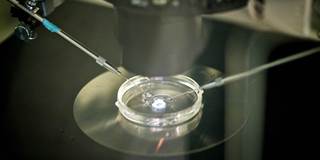The Nuffield Council on Bioethics’ recent endorsement of human genome editing has drawn fire from experts – including at least one who consulted on the council's previous report. While Britain may be seeking to set a new course for gene editing, at the moment, it’s not clear that the benefits outweigh the risks.
LONDON – On July 17, the United Kingdom’s influential Nuffield Council on Bioethics implicitly endorsed “heritable genome editing,” declaring the practice of altering the DNA of a human embryo “morally permissible” under certain circumstances. The council’s report was the product of 20 months of consultation with many experts in the UK and beyond, and also built on a prior report to which I contributed testimony.
But I have serious concerns about the new report’s conclusions. Simply put, I don’t believe the recommendations adequately consider all the ethical or medical risks of manipulating heritable genes. Nor do I think the report gives sufficient weight to the question of whether sufficiently strong safeguards ever could be put in place to prevent the technology’s misuse.
The Nuffield report focuses on “germline” gene editing, or genetic alterations of human embryos and gametes that are passed on to future generations. This type of gene modification is not currently legal in the UK, although “somatic” genome editing – performed on the non-heritable genes of individual patients – is permitted.

LONDON – On July 17, the United Kingdom’s influential Nuffield Council on Bioethics implicitly endorsed “heritable genome editing,” declaring the practice of altering the DNA of a human embryo “morally permissible” under certain circumstances. The council’s report was the product of 20 months of consultation with many experts in the UK and beyond, and also built on a prior report to which I contributed testimony.
But I have serious concerns about the new report’s conclusions. Simply put, I don’t believe the recommendations adequately consider all the ethical or medical risks of manipulating heritable genes. Nor do I think the report gives sufficient weight to the question of whether sufficiently strong safeguards ever could be put in place to prevent the technology’s misuse.
The Nuffield report focuses on “germline” gene editing, or genetic alterations of human embryos and gametes that are passed on to future generations. This type of gene modification is not currently legal in the UK, although “somatic” genome editing – performed on the non-heritable genes of individual patients – is permitted.